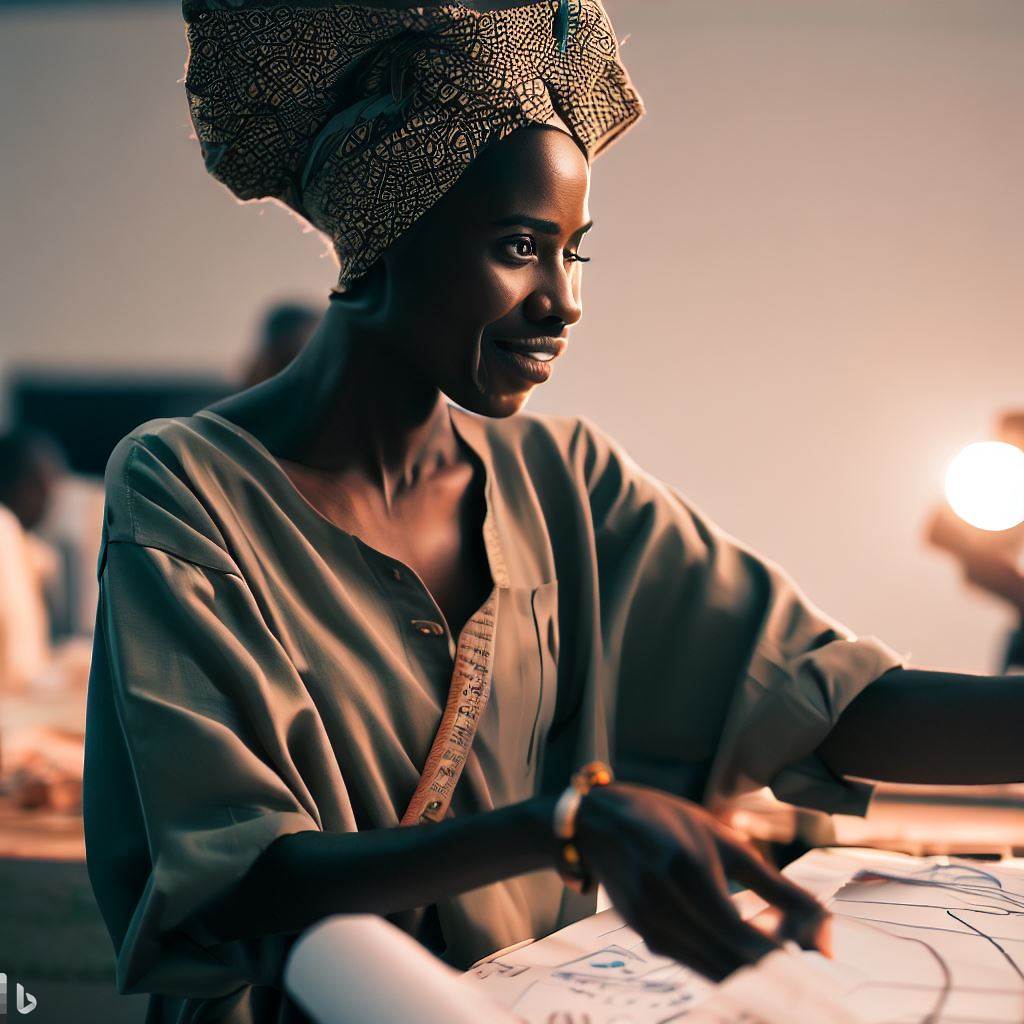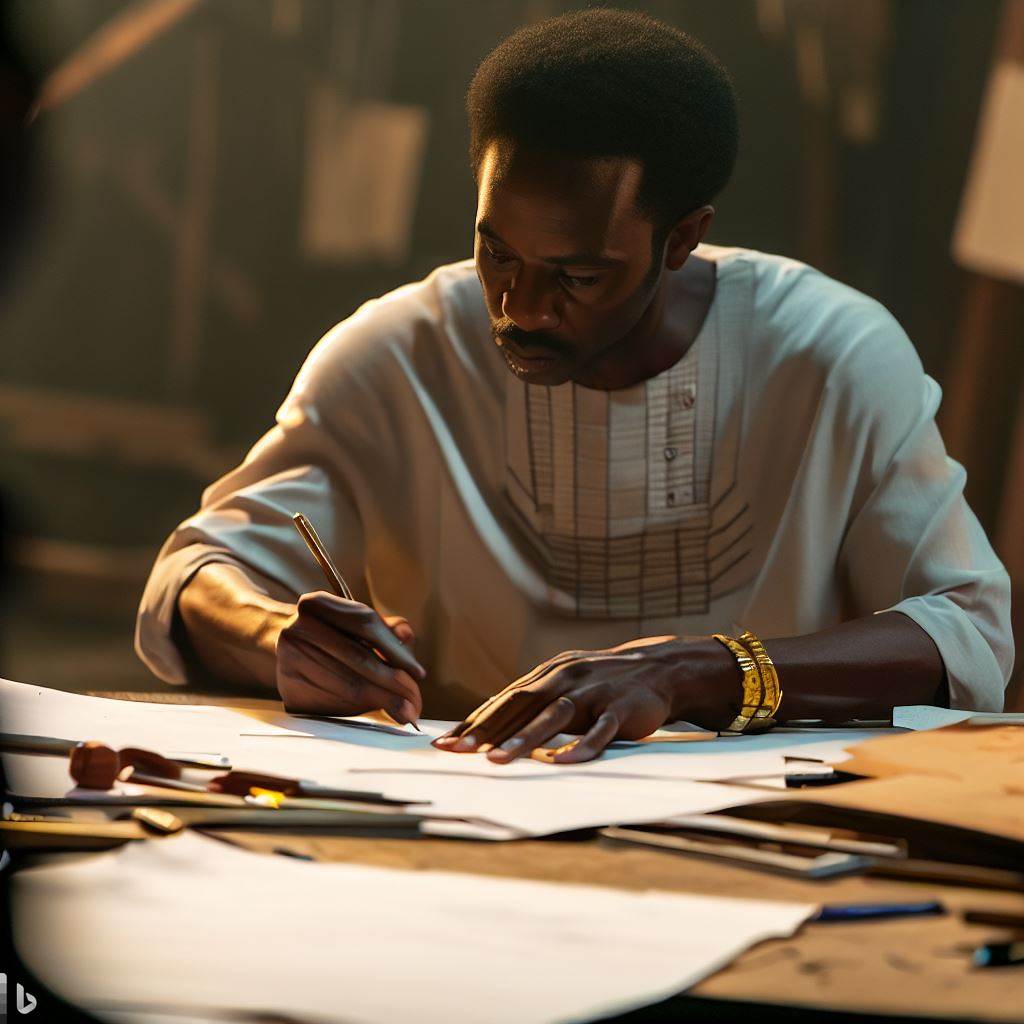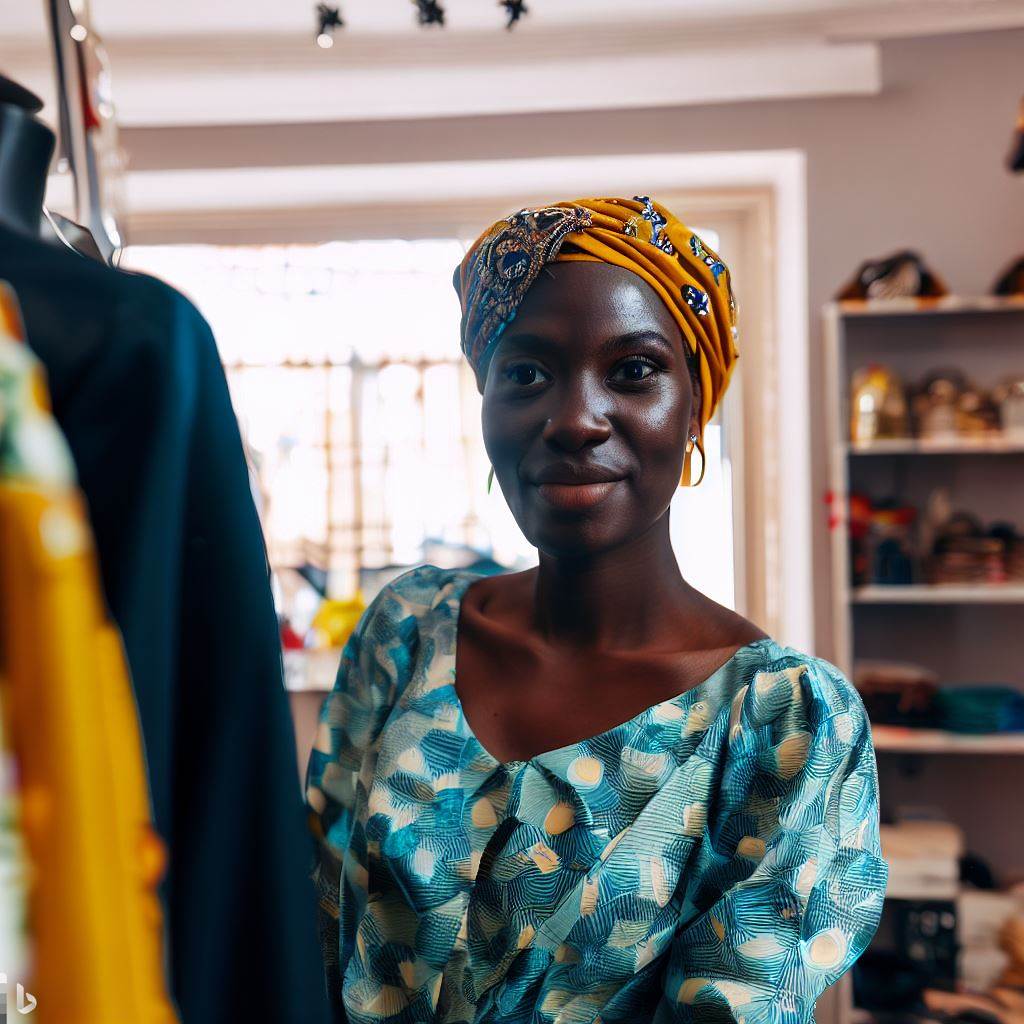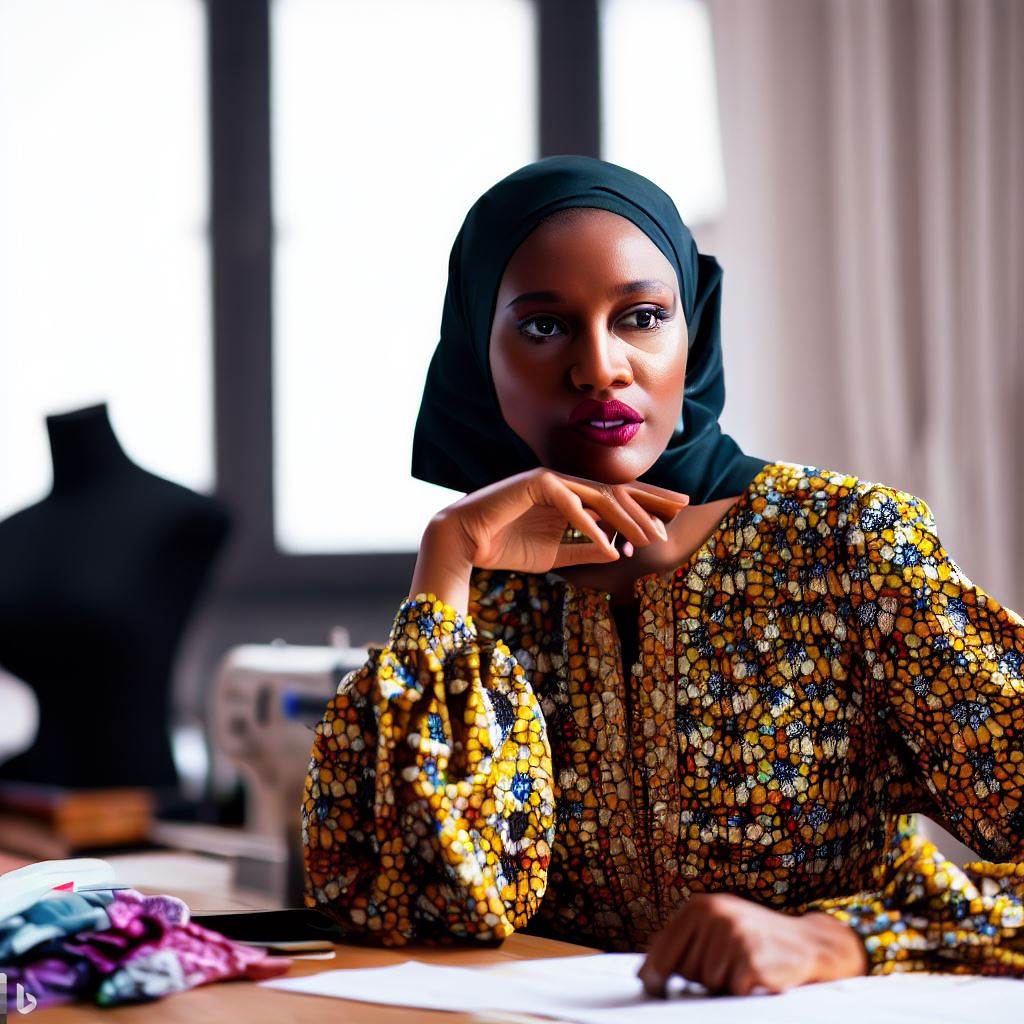Introduction
A. Nigerian Fashion Industry
Nigeria’s fashion scene is vibrant, diverse, and ever-evolving, reflecting the nation’s rich culture and creativity.
B. Impact on Local Economies
- Employment Generation: The fashion industry is a significant source of employment, offering jobs to tailors, weavers, and artisans.
- Economic Growth: It contributes to economic growth by stimulating demand for textiles, accessories, and raw materials.
- Export Opportunities: Nigerian designers increasingly export their creations, boosting foreign exchange earnings.
- Tourism: Fashion events draw tourists, promoting local businesses and hospitality industries.
- Skills Development: Fashion education programs empower youths with valuable skills for entrepreneurship.
- SME Development: It fosters Small and Medium-sized Enterprises (SMEs), encouraging local entrepreneurship.
- Cultural Preservation: Nigerian fashion preserves and promotes indigenous textiles and techniques.
- Innovation Hub: It nurtures innovation, pushing the boundaries of fashion design in Nigeria.
- Income Distribution: Fashion contributes to a more equitable income distribution within communities.
- Social Impact: It enhances cultural identity, self-expression, and self-esteem among Nigerians.
Nigerian fashion designers play a pivotal role in driving these economic benefits and influencing local economies positively.
Read: Exploring Fashion Designer Salaries in Nigeria 2024
Overview of Nigerian Fashion Designers
A. Definition of a fashion designer
Fashion designers are creative individuals who design and create clothing, accessories, and footwear that reflect current trends and styles in the fashion industry.
B. Number of fashion designers in Nigeria
Nigeria is home to a growing number of fashion designers, with the industry experiencing significant growth in recent years.
There are currently thousands of talented designers in the country.
C. Rise in popularity and recognition of Nigerian fashion designers
Nigerian fashion designers have gained international acclaim and have become increasingly popular not only in Nigeria but also on the global fashion scene.
Their unique designs, use of vibrant colors, and incorporation of African prints have captivated audiences worldwide.
Some notable Nigerian fashion designers
- Deola Sagoe: Deola Sagoe is a renowned Nigerian fashion designer known for her exquisite haute couture and ready-to-wear collections.
She combines traditional African fabrics with modern design techniques. - Lisa Folawiyo: Lisa Folawiyo is celebrated for her label, Jewel by Lisa, which focuses on incorporating traditional African textiles into contemporary fashion.
Her bold and vibrant designs have gained her recognition both locally and internationally. - Mai Atafo: Mai Atafo is a prominent Nigerian fashion designer known for his impeccable tailoring and attention to detail.
He has dressed numerous celebrities and has showcased his collections at prestigious fashion events across the globe. - Tiffany Amber: Tiffany Amber, founded by Folake Coker, is one of Nigeria’s leading fashion brands.
The label is known for its sophisticated and elegant designs, which have been worn by celebrities such as Oprah Winfrey and Angela Bassett. - Maki Oh: Maki Oh, created by Amaka Osakwe, is a contemporary Nigerian fashion brand that celebrates African heritage and culture. The brand has gained international recognition and has been worn by celebrities like Beyoncé and Rihanna.
The impact of Nigerian fashion designers on local economies
- Job creation: The growth of the fashion industry in Nigeria has led to the creation of numerous job opportunities. From garment production to marketing and distribution, designers contribute to employment generation.
- Industrial growth: Nigerian fashion designers play a vital role in driving industrial growth by utilizing local resources and promoting local craftsmanship. This helps in the development of related industries such as textile manufacturing and retail.
- Boosting tourism: Nigerian fashion designers attract attention from international tourists who are interested in exploring the country’s rich fashion heritage. This contributes to increased tourism revenues and promotes cultural exchange.
- Empowerment of local artisans: Nigerian fashion designers often collaborate with local artisans, such as weavers and textile makers, providing them with a platform to showcase their skills and preserve traditional craftsmanship.
- Branding Nigeria: Through their innovative and unique designs, Nigerian fashion designers help to project a positive image of Nigeria on the global stage, highlighting the country’s creativity and fashion-forwardness.
Basically, Nigerian fashion designers have made significant contributions to the country’s economy by creating employment opportunities, driving industrial growth, boosting tourism, empowering local artisans, and branding Nigeria as a fashion destination.
With their talent and creativity, they continue to shape and transform the fashion industry both locally and globally.
Job Creation and Employment
A. Opportunities for local artisans and craftsmen
Nigerian fashion designers provide opportunities for local artisans and craftsmen to showcase their skills.
Through collaborations, designers empower artisans to create unique and high-quality fashion pieces.
Traditional weaving, dyeing, and embroidery techniques are revived and preserved by these collaborations.
Local artisans and craftsmen are able to earn a living and support their families through these opportunities.
The fashion industry serves as a platform for these skilled individuals to gain recognition and visibility.
Transform Your Career in Nigeria
Discover unmatched expertise with our personalized Career Consulting service. Navigate Nigeria’s job market with a strategy tailored just for you.
Get StartedB. Employment in the fashion industry
The Nigerian fashion industry creates employment opportunities for a wide range of professionals.
Designers hire pattern makers, tailors, seamstresses, and production assistants to bring their designs to life.
Models, photographers, stylists, and makeup artists are also sought after for fashion shows and photo shoots.
Retail stores and boutiques employ sales associates, visual merchandisers, and store managers.
The growth of e-commerce has opened up additional job roles in online marketing and customer service.
C. Role of fashion designers in promoting entrepreneurship
- Nigerian fashion designers act as catalysts for entrepreneurship and self-employment within the industry.
- They serve as mentors and inspire aspiring designers to start their own fashion businesses.
- Designers organize workshops, seminars, and training programs to share their expertise and knowledge.
- Through these initiatives, they encourage others to become entrepreneurs and create their own jobs.
- By supporting local talent and providing opportunities, designers contribute to the growth of the economy.
Generally, Nigerian fashion designers have a significant impact on local economies through job creation and employment.
They create opportunities for local artisans and craftsmen, preserving traditional techniques and empowering them to earn a living.
The fashion industry also provides employment for a diverse range of professionals, from tailors and seamstresses to models and photographers.
Moreover, designers play a crucial role in promoting entrepreneurship, inspiring others to start their own businesses.
By nurturing local talent and supporting the growth of the fashion industry, designers contribute to the overall economic development of Nigeria.
Creation of Local Supply Chains
A. Sourcing of materials and textiles from local producers
One way Nigerian fashion designers impact local economies is by sourcing materials and textiles from local producers.
Instead of relying on imported fabrics, they actively seek out local suppliers to support the homegrown industry.
By doing this, fashion designers not only contribute to the growth of local textile producers but also help to create a sustainable industry.
This reduces the country’s reliance on imports and supports local farmers and artisans.
B. Collaboration with local businesses and manufacturers
Another way Nigerian fashion designers boost local economies is through collaboration with local businesses and manufacturers.
They actively seek partnerships with local manufacturers for their production needs, such as sewing and tailoring.
When fashion designers choose to work with local manufacturers, it creates a domino effect of economic opportunities.
The manufacturers can expand their operations, create more jobs, and generate revenue for the local community.
C. Boosting local industries and contributing to economic growth
Overall, the efforts of Nigerian fashion designers in creating local supply chains contribute to boosting local industries and stimulating economic growth.
By sourcing materials locally and partnering with local businesses, fashion designers are actively investing in the development of their communities.
They create a demand for local products and services, which has a ripple effect on the entire local economy.
Additionally, the growth of the fashion industry in Nigeria has a direct impact on tourism and cultural preservation.
The unique designs and craftsmanship showcased by Nigerian fashion designers attract visitors from all over the world, promoting the country’s culture and heritage.
Essentially, Nigerian fashion designers are key players in driving economic growth and development through the creation of local supply chains.
Publish Your Professional Profile, Business or Brand
Showcase your expertise, gain trust, and boost visibility instantly on Professions.ng.
Publish NowBy sourcing materials locally and collaborating with local businesses, they contribute to the growth of various industries and empower their communities.
Read: Education for Fashion Designers in Nigeria: What You Need
Increased Export Opportunities
A. Global demand for Nigerian fashion products
- Nigerian fashion designers have garnered attention worldwide for their unique and vibrant designs.
- International consumers have a growing interest in African fashion, including Nigerian styles.
- The global demand for Nigerian fashion products presents a great export opportunity for local designers.
B. Exporting Nigerian fashion to international markets
- Nigerian fashion designers can tap into the global market by exporting their products.
- Exporting allows designers to expand their customer base and increase their revenue.
- Designers can showcase the rich culture and heritage of Nigeria through their fashion exports.
C. Impact of fashion designers on Nigerian trade balance
- Increased exports of Nigerian fashion products contribute positively to the country’s trade balance.
- Fashion designers play a crucial role in reducing Nigeria’s dependence on oil exports.
- The fashion industry can diversify the Nigerian economy and promote sustainable growth.
By exporting Nigerian fashion products, designers contribute to the growth of the local economy.
They create employment opportunities for local artisans and skilled workers.
The revenue generated from exports helps to improve infrastructure and enhance local industries.
Furthermore, exporting Nigerian fashion fosters cultural exchange and promotes Nigeria’s image abroad.
Through their designs, Nigerian fashion designers showcase the richness of the nation’s culture and traditions.
They represent Nigeria as a vibrant and creative hub in the global fashion industry.
The demand for Nigerian fashion products is driven by the unique blend of traditional and contemporary designs.
Consumers around the world appreciate the craftsmanship and attention to detail in Nigerian fashion.
Designers are not only making an impact locally but also positioning Nigeria as a fashion destination.
The increased export opportunities empower Nigerian designers to expand their businesses and reach new markets.
They have the chance to showcase their talent on an international stage and compete with global brands.
Exporting also enables designers to bring in foreign exchange and contribute to the country’s economic growth.
Moreover, the fashion industry’s growth and success can inspire other sectors and entrepreneurs in Nigeria.
By diversifying the economy, Nigeria can reduce its dependency on oil and create a more sustainable future.
Essentially, Nigerian fashion designers have a significant impact on local economies through increased export opportunities.
The global demand for Nigerian fashion products allows designers to tap into new markets and boost the country’s trade balance.
Exporting fashion products helps to create employment, improve infrastructure, and promote Nigeria’s cultural heritage.
By embracing their unique designs and showcasing their talent globally, Nigerian fashion designers are elevating the country’s fashion industry.
Read: How to Start a Fashion Design Business in Nigeria
Promotion of Cultural Heritage and Tourism
A. Incorporation of traditional Nigerian elements in designs
- Nigerian fashion designers often incorporate traditional Nigerian elements in their designs.
- This includes the use of traditional fabrics, such as Ankara and Aso Oke, in their creations.
- By incorporating these elements, designers are able to showcase the rich cultural heritage of Nigeria.
- This not only gives the designs a unique and distinct identity but also helps in preserving Nigerian traditions.
B. Attraction of tourists through fashion events and showcases
- Nigerian fashion designers also play a crucial role in attracting tourists to the country.
- Fashion events and showcases, such as Lagos Fashion Week, provide a platform for designers to display their work.
- These events attract both local and international tourists, who are interested in exploring Nigerian fashion.
- The presence of renowned fashion designers and unique designs further adds to the appeal for tourists.
C. Economic benefits of cultural preservation
- The promotion of cultural heritage through fashion design has significant economic benefits.
- It helps in creating job opportunities for local artisans and craftsmen, who produce traditional fabrics.
- The demand for these fabrics increases, generating income and improving the livelihoods of these artisans.
- Additionally, the fashion industry stimulates local economies by boosting tourism and increasing revenue.
- Tourists visiting the country for fashion-related activities contribute to the local economy through spending on accommodation, food, and other goods and services.
- This creates a positive cycle of economic growth and development in the local communities.
- Moreover, the preservation of cultural heritage helps in attracting foreign investments and collaborations.
- International fashion brands and designers are drawn towards Nigeria’s rich cultural heritage, leading to partnerships and collaborations.
- These collaborations not only bring in investments but also provide opportunities for local designers to gain global recognition.
In general, Nigerian fashion designers have a significant impact on local economies through the promotion of cultural heritage and tourism.
By incorporating traditional Nigerian elements in their designs, designers preserve the rich cultural heritage of the country.
Fashion events and showcases attract tourists, boosting tourism and generating revenue.
Moreover, the economic benefits of cultural preservation are seen in job creation, increased demand for traditional fabrics, and the attraction of foreign investments.
Overall, the fashion industry plays a crucial role in driving economic growth and development in Nigeria.
Read: Challenges and Rewards of Fashion Design in Nigeria
Explore Further: A Guide to Event Photography in Nigeria’s Bustling Cities
Find Out More: Nigeria’s Interior Design Industry: Salary and Job Outlook
Social Impact and Empowerment
A. Enhancing self-confidence and self-expression
- Nigerian fashion designers have a significant impact on local economies through their ability to enhance self-confidence and self-expression.
- By creating unique and culturally inspired designs, these designers empower individuals to embrace their identities and express themselves through fashion.
- Through the use of vibrant colors, traditional fabrics, and modern styles, designers boost the self-esteem of their customers and help them feel proud of their heritage.
- This newfound confidence not only improves the mental and emotional well-being of individuals but also has a positive ripple effect on their interactions within their communities.
- As people gain more confidence in their appearance, they become more willing to engage in social activities, networking, and entrepreneurship, thus contributing to the local economy.
B. Breaking barriers and challenging societal norms
- Nigerian fashion designers play a crucial role in breaking barriers and challenging societal norms by redefining beauty standards and encouraging inclusivity.
- These designers embrace diversity by celebrating different body types, skin tones, and cultural backgrounds, creating a more inclusive fashion industry.
- By promoting models that represent a wide range of ethnicities and sizes, designers challenge the notion of one-size-fits-all beauty, promoting body positivity.
- This movement towards inclusivity not only empowers individuals who have previously felt marginalized but also encourages other industries to follow suit, leading to a more inclusive society.
- Through their designs, fashion designers in Nigeria are reshaping the perception of beauty, encouraging individuals to embrace their uniqueness and stand out from societal norms.
C. Empowering women and marginalized groups through fashion
- Nigerian fashion designers are playing a pivotal role in empowering women and marginalized groups by providing opportunities for economic independence.
- Many designers champion female empowerment by employing and training women, giving them financial stability and the ability to support themselves and their families.
- By providing skill development programs and empowering marginalized groups with the necessary resources, designers enable individuals to break free from cycles of poverty.
- Fashion has become a means of economic empowerment for many women in Nigeria, allowing them to start their own businesses and become financially self-sufficient.
- Through their innovative designs and entrepreneurial spirit, Nigerian fashion designers are changing the narrative for women and marginalized groups, empowering them to lead successful and fulfilling lives.
In essence, Nigerian fashion designers have a profound impact on local economies by enhancing self-confidence and self-expression, breaking barriers, challenging societal norms, and empowering women and marginalized groups.
Through their creativity and determination, these designers not only contribute to economic growth but also foster a more inclusive and empowered society.
Read: Fashion Design in Nigeria: A Career with Global Impact
Conclusion
To recap, Nigerian fashion designers play a crucial role in impacting local economies.
It is essential to recognize the significant contribution of Nigerian fashion designers to local economies.
In the end, Nigerian fashion designers are not only artists but also economic influencers, driving growth and empowering communities.




